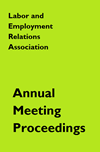How Did Unions Protect Workers Rights after the 1997 Economic Crisis in Korea?
Abstract
Until the 1997 foreign currency crisis, unions in Korea worked to increase wages and to improve benefits, because job security was implicitly guaranteed by the patriarchal culture of Korean firms. After the crisis, the firms strongly demanded layoffs to overcome their financial difficulties by reducing labor costs and increasing labor flexibility. This paper analyzes the unions’ response during the fourmonth period right after the crisis. Firms with unions used pseudovoluntary retirement programs more frequently than firms without unions. There was no difference between unionized and nonunionized firms in the use of layoffs, however. Unions influenced the downsizing process by participating in decision-making procedures.Downloads
Issue
Section
2004 San Diego, CA Proceedings

